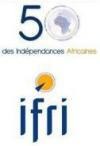
Practical information
Themes and regions
Related centers and programs
This is a private event.
Learn more about our corporate support packagesEvent organised in association with the International Network on Conflict and Fragility (INCAF), OECD.
Working language: French
With:
Louise Avon
Directrice déléguée de l'Agence Française de Développement (AFD),
ancien ambassadeur de France au Mozambique
Damien Helly
Chargé de recherches à l'Institut d'Études de Sécurité de l'Union Européenne
Henriette Martinez
Députée des Hautes-Alpes,
présidente de la section française de l'Assemblée parlementaire de la Francophonie
Georges Serre
Directeur général adjoint de la direction générale de la Mondialisation, du Développement et des Partenariats (DGM), ancien ambassadeur de France au Cameroun et en République démocratique du Congo
Alexandra Trzeciak-Duval
Chef de la division de la coordination des politiques
à la direction de la Coopération pour le développement de l'OCDE
Modérateur :
François Gaulme
Chargé de mission à l'Agence Française de Développement
à la cellule "Prévention des crises et post-conflit"
Fragile States are unlikely to reach the Millennium goals. Most of the actors, political as well as economical, are afraid to commit in these States because they are seen as too "dangerous".
This conference on fragile States aims to explain what kind of experiences -positive or negative - took place on the field. By explaining how and why they were a success or a failure, we wish to contribute better knowledge to the political actors and to the public.
The conference will begin with the presentation of a report edited by OECD. Our guests will present their experience on these States. We aim to question the stereotypes about fragile States and to make the public understand that they are not necessarily dangerous.
Related Subjects
Other events

From Ambition to Action: Exploring Technological Partnerships with India
The 16th EU-India Summit, held on January 27th in New Delhi with European leaders António Costa, Ursula von der Leyen, and Prime Minister Narendra Modi, marks a significant milestone in deepening EU-India relations. At the same time, official bilateral visits from EU member states are on the rise, including that of the French President, who visited India in February to participate in the Artificial Intelligence Summit. As India asserts its technological ambitions and seeks to reduce its dependence on China, Europe is stepping up its efforts to diversify its strategic partnerships.

The Enlargement of the European Union: A Strategic Choice? France, the Western Balkans and the EU in an Uncertain Geopolitical Context
Russia’s war against Ukraine has brought the enlargement of the European Union back to the centre of European strategic debates. In this context, the Western Balkans have regained heightened visibility in discussions on the continent’s security, at a time when the international environment is marked by a growing number of destabilising factors.






